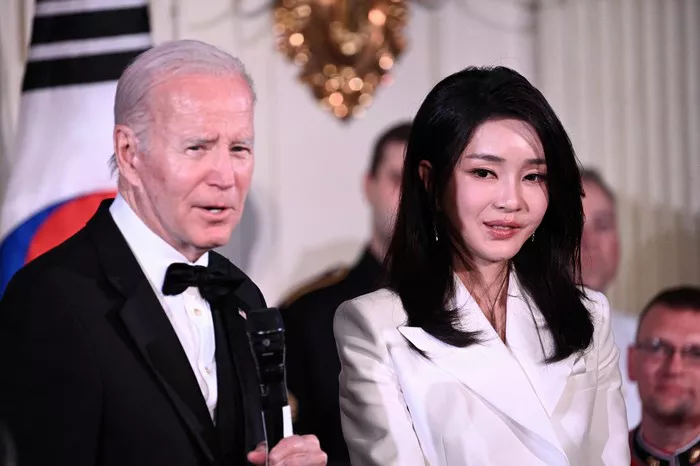The recent Dior handbag scandal may have been a mere surface-level controversy, but it revealed deeper, more troubling dynamics within the Yoon administration in South Korea. The fixation on superficial appearances, particularly surrounding the First Lady, Kim Keon-hee, has sparked a broader conversation about the toxic intersection of power, beauty, and plastic surgery.
Behind the scenes, sources claim that President Yoon Suk-yeol’s obsession with his wife’s looks went far beyond the ordinary, with the leader reportedly pressuring Kim to undergo numerous cosmetic procedures to maintain a youthful, glamorous image befitting her role as the First Lady. Insiders suggest that Yoon was hypercritical of Kim’s appearance, constantly nitpicking perceived flaws and urging her to keep up with the latest trends in cosmetic surgery.
This relentless focus on physical perfection not only eroded Kim’s self-confidence but became a distraction from more pressing national issues. As the First Couple became increasingly consumed by their pursuit of aesthetic ideals, the public’s attention shifted from political matters to personal appearances, further damaging the Yoon administration’s standing. Kim’s rumored surgical enhancements and lavish indulgences fueled public resentment, while Yoon’s handling of the situation—including a brief declaration of martial law—was seen as an attempt to cling to power amid rising scandals.
The public’s growing disillusionment with Yoon’s priorities ultimately led to a sharp decline in his approval ratings. His fixation on appearances over substantive governance left him increasingly isolated and vulnerable. The quest for perfection, it seemed, was not only damaging Kim’s self-esteem but also undermining her husband’s leadership, tarnishing his legacy in the process.
At the heart of this controversy is Kim Keon-hee herself, the controversial First Lady, whose struggle with societal pressures and rumored plastic surgery procedures have made her the focal point of national debate. Much like the French queen Marie Antoinette, Kim has become a symbol of excess and vanity in the public eye. The media frenzy over her alleged designer handbag acceptance and the swirling allegations of stock manipulation have overshadowed her husband’s presidency, making her a target for public scorn.
However, beneath these sensational headlines lies a more complex issue: the intense societal pressure placed on women—especially those in the public eye—to conform to unrealistic and narrow beauty standards. In South Korea, where appearance is often considered a reflection of one’s worth, the temptation to seek validation through cosmetic enhancements is all too real. The pursuit of beauty is not simply an individual choice but a response to the overwhelming pressure to meet society’s often unattainable ideals.
This obsession with physical perfection, though particularly pronounced in South Korea, is not unique to the country. Globally, powerful men have long been captivated by the allure of beauty, often seeking partners whose physical attributes conform to prevailing societal ideals. U.S. President-elect Donald Trump, known for his vanity and obsession with appearances, exemplifies this trend. His three marriages to former models—Ivana, Marla, and Melania—have been the subject of intense public scrutiny, with much of the media focus centered on the physical attributes of these women and how they have shaped Trump’s public image.
In an era where a woman’s value is often reduced to her outward appearance, the pressure to conform can be overwhelming. For many women, the promise of cosmetic procedures offers a path to acceptance, success, and, in some cases, power. Yet, as Kim Keon-hee and others have discovered, the pursuit of perfection comes at a significant cost—both financially and emotionally. The promise of beauty and power through surgery may seem alluring, but it often results in the erosion of self-worth and the perpetuation of harmful beauty myths.
This cycle of insecurity and surgical intervention highlights a troubling irony: the very men who wield immense power are often the ones perpetuating the societal pressures that drive women to these extreme measures. As figures like Kim Keon-hee navigate the public eye, their choices and appearances are scrutinized and judged, overshadowing their accomplishments and reducing them to mere objects of desire or disdain.
The pressure to meet these unrealistic expectations is not just a personal struggle for women like Kim, but a reflection of a broader societal issue. The intersection of power, beauty, and plastic surgery is a global phenomenon, and as the world watches, the consequences of this obsession with physical perfection are becoming increasingly clear. The challenge now is whether society will continue to place such an emphasis on outward appearance, or whether it will shift its focus to more meaningful measures of success and worth.
You Might Be Interested In:

